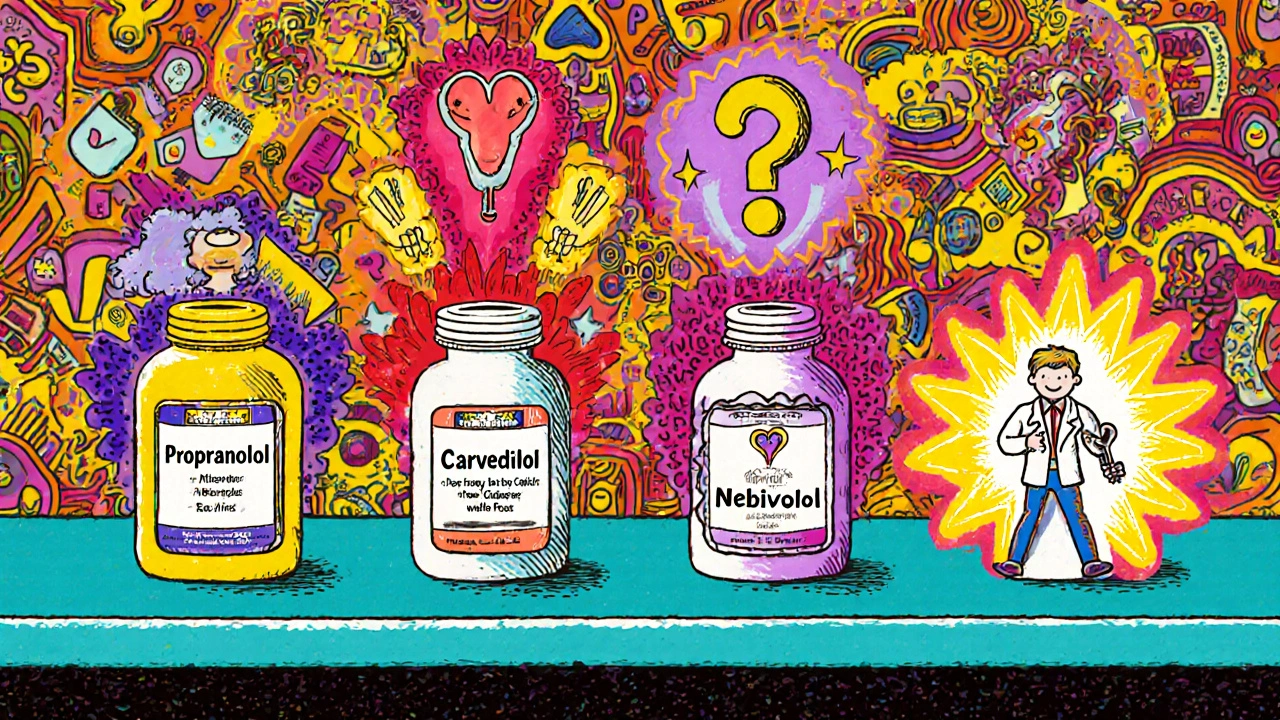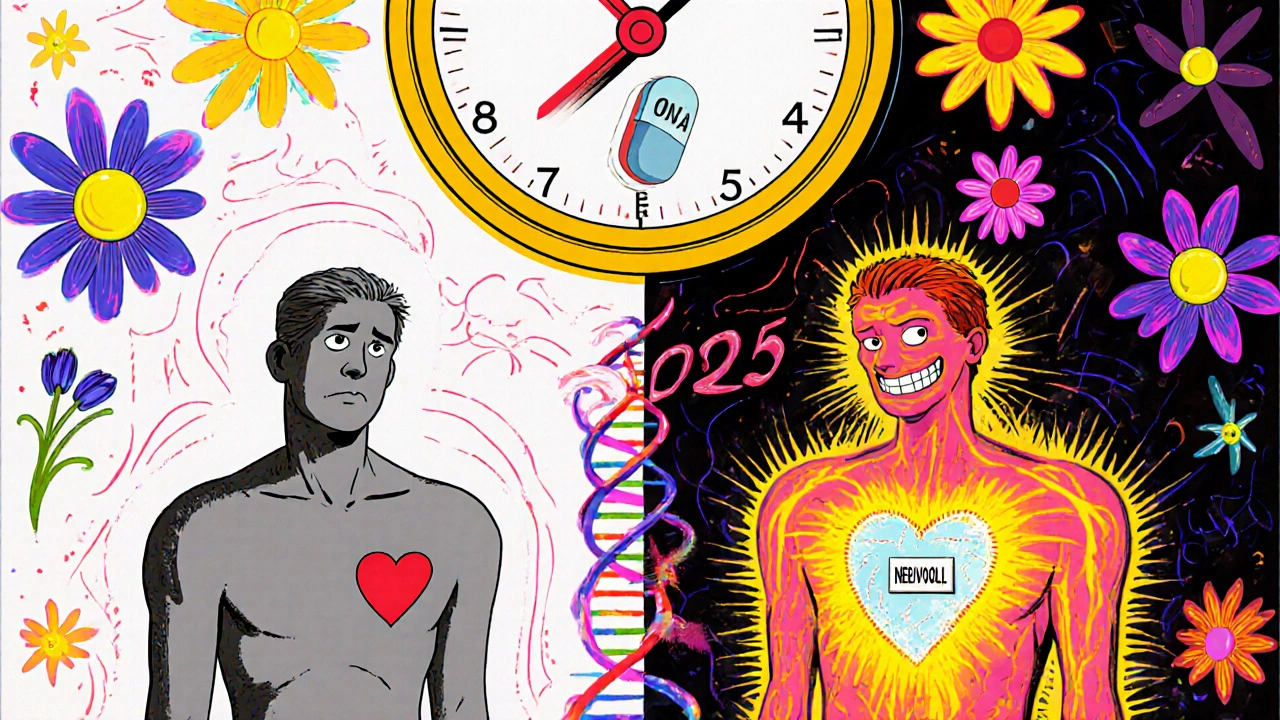Beta-Blockers: How Different Types Interact and Why Drug Choice Matters
 Nov, 20 2025
Nov, 20 2025
Not all beta-blockers are the same
When your doctor prescribes a beta-blocker, it’s easy to assume they’re all pretty much alike. But that’s not true. The difference between propranolol, metoprolol, carvedilol, and nebivolol isn’t just in the name-it’s in how they work, what side effects they cause, and who they help most. These drugs block adrenaline, yes, but beyond that, they behave in very different ways. Choosing the right one isn’t just about treating high blood pressure or heart failure. It’s about matching the drug’s chemistry to your body’s needs.
How beta-blockers actually work
Beta-blockers stop adrenaline from binding to beta receptors in your heart and blood vessels. Adrenaline is your body’s natural stress hormone-it speeds up your heart, raises your blood pressure, and makes your muscles tense. In people with heart disease, that extra stress can be dangerous. Beta-blockers calm things down by reducing heart rate, lowering blood pressure, and decreasing how hard the heart pumps. But not all beta receptors are the same. There are three main types: beta-1 (mostly in the heart), beta-2 (in the lungs and blood vessels), and beta-3 (involved in fat metabolism and blood vessel relaxation). The drugs you take determine which receptors they block-and that’s where the real differences begin.
First-generation: The old-school blockers
Propranolol was the first beta-blocker ever made, introduced in the 1960s. It’s nonselective, meaning it blocks both beta-1 and beta-2 receptors. That makes it effective for heart conditions, migraines, and even performance anxiety. But it also affects your lungs. For someone with asthma or COPD, propranolol can trigger wheezing or shortness of breath. About 20-30% of people with lung issues have a bad reaction. It’s also taken multiple times a day, which makes it harder to stick with. On Drugs.com, users give propranolol a 6.2 out of 10, with nearly 40% reporting moderate to severe side effects like fatigue, depression, or cold hands and feet. It’s cheap, widely available, and still used-but only when newer options aren’t suitable.
Second-generation: The heart-focused ones
Drugs like metoprolol, atenolol, and bisoprolol were developed to be more selective. They mainly target beta-1 receptors in the heart, leaving the lungs mostly alone. That makes them safer for people with asthma or diabetes. Metoprolol comes in two forms: the immediate-release version (Lopressor) needs to be taken twice daily, while the extended-release version (Toprol XL) is once daily-making adherence easier. Bisoprolol is even more heart-specific and has fewer side effects overall. In patient surveys, bisoprolol scores a 7.1 out of 10, with lower rates of fatigue and sleep problems than propranolol. These are the go-to choices for most people with high blood pressure or after a heart attack. The American Heart Association says 92% of post-heart attack patients get one of these. But they don’t help much with blood vessel stiffness-that’s where the next generation comes in.

Third-generation: The game-changers
Carvedilol and nebivolol aren’t just beta-blockers-they’re multitaskers. Carvedilol also blocks alpha-1 receptors, which helps relax blood vessels. That means it doesn’t just slow the heart-it lowers resistance in your arteries, reducing pressure more effectively. In the US Carvedilol Heart Failure Study (1996), carvedilol cut death rates by 35% compared to placebo. Nebivolol works differently: it triggers your blood vessels to release nitric oxide, a natural vasodilator. This improves blood flow, reduces oxidative stress in the heart, and even helps with erectile dysfunction. A Reddit thread from a cardiology nurse in 2023 noted that 65% of men over 50 on nebivolol reported better sexual function, compared to only 35% on older beta-blockers. These two are now the gold standard for heart failure with reduced ejection fraction, according to the European Society of Cardiology. They’re not first-line for simple high blood pressure, but for heart failure, they’re essential.
Why dosing and formulation matter
It’s not just which drug you get-it’s how you take it. Metoprolol tartrate (Lopressor) needs to be taken twice a day. Miss a dose, and your heart rate can spike. Metoprolol succinate (Toprol XL) is extended-release, so it’s once daily and more stable. Same active ingredient, very different results. Carvedilol requires slow titration. You start at 3.125 mg twice daily and take 8-16 weeks to reach the full 25 mg dose. Rush it, and you risk low blood pressure or dizziness. Bisoprolol can be ramped up faster-often in 4-8 weeks. Nebivolol comes in fixed doses and doesn’t need much titration. The FDA warns that stopping any beta-blocker suddenly can trigger a heart attack. The risk jumps 300% in the first two days. That’s why you never quit cold turkey, no matter how you feel.
Real-world trade-offs
Let’s say you’re 68, have heart failure, and also have mild COPD. Propranolol? Too risky. Metoprolol? Fine, but it won’t help your stiff arteries. Carvedilol? Perfect-it helps the heart and opens up blood vessels. But you’re worried about dizziness. Your doctor starts you low and moves slowly. Now imagine you’re 55, have high blood pressure, and are active. You’re on metoprolol, but you’re always tired. Switching to nebivolol might give you the same blood pressure control with more energy and better sexual function. These aren’t theoretical differences. They’re daily realities for patients. A Cleveland Clinic survey found 85% of heart failure patients stuck with carvedilol because it caused fewer breathing issues than older drugs-even though it required careful dose adjustments.

What’s changing in 2025
The beta-blocker market is shifting. In 2022, second- and third-generation drugs made up 85% of prescriptions, even though first-gen propranolol is cheaper. Why? Because outcomes matter more than cost. New guidelines from the ACC/AHA in 2022 recommend carvedilol, bisoprolol, metoprolol succinate, or nebivolol for heart failure-and only those. The FDA approved a new drug in 2023, entricarone, which combines beta-3 and beta-1 blocking for heart failure with preserved ejection fraction. A combination pill of nebivolol and valsartan is coming in 2024. Meanwhile, researchers are testing gene-based tools to predict who responds best to which beta-blocker. The goal? Personalized dosing based on your DNA, not just your symptoms.
Who should avoid beta-blockers
Beta-blockers aren’t for everyone. If you have severe asthma or untreated COPD, nonselective ones like propranolol are dangerous. Even selective ones can cause trouble in advanced lung disease. If you have very low blood pressure, a slow heart rate, or heart block, they can make things worse. People with diabetes need to be careful-beta-blockers can hide low blood sugar symptoms like a fast heartbeat. And if you’re elderly, especially over 80, studies show nearly 30% of beta-blocker prescriptions are inappropriate based on current guidelines. That’s why doctors now use tools like STOPP/START criteria to avoid overprescribing.
Bottom line: Match the drug to the patient
There’s no single best beta-blocker. The right choice depends on your condition, your other health issues, your age, and even your lifestyle. Propranolol has its place-but it’s fading. Metoprolol and bisoprolol are solid for most heart and blood pressure cases. Carvedilol and nebivolol are the top picks for heart failure. The key isn’t just knowing what they do-it’s knowing who they help most. Ask your doctor: Why this one? Are there alternatives? What side effects should I watch for? Because with beta-blockers, the difference between a good result and a bad one often comes down to the specific drug you’re taking.
Can I take a beta-blocker if I have asthma?
It depends. Nonselective beta-blockers like propranolol can trigger severe bronchospasm in people with asthma and are generally avoided. Cardioselective beta-blockers like metoprolol, bisoprolol, or nebivolol are safer because they mainly affect the heart, not the lungs. But even these can cause breathing issues in some people, especially at high doses or if lung disease is advanced. Always tell your doctor about your asthma before starting any beta-blocker. In many cases, alternatives like calcium channel blockers or ACE inhibitors are preferred.
Why is carvedilol preferred for heart failure?
Carvedilol does more than just block beta receptors-it also blocks alpha-1 receptors, which helps relax blood vessels and reduce the heart’s workload. This dual action improves blood flow and reduces strain on the heart muscle. In clinical trials, carvedilol cut death rates by 35% in heart failure patients compared to placebo. It also reduces oxidative stress and inflammation in heart tissue, which helps prevent further damage. Because of these benefits, major guidelines from the European Society of Cardiology and the American College of Cardiology list carvedilol as a first-choice drug for heart failure with reduced ejection fraction.
Do beta-blockers cause weight gain?
Some people gain weight on beta-blockers, especially older ones like propranolol and atenolol. This may be due to reduced metabolism and lower physical activity from fatigue. Newer agents like nebivolol and carvedilol are less likely to cause weight gain. In fact, nebivolol may even help with fat metabolism because of its beta-3 activity. If you notice unexplained weight gain after starting a beta-blocker, talk to your doctor. It doesn’t happen to everyone, but it’s common enough to be monitored.
Can beta-blockers affect my sex life?
Yes, some beta-blockers can cause erectile dysfunction or reduced libido, especially older ones like propranolol and metoprolol. This is thought to be due to reduced blood flow and lower testosterone levels. Nebivolol is different-it increases nitric oxide production, which improves blood vessel function. Studies and patient reports show that men on nebivolol are more likely to report improved sexual function than those on other beta-blockers. If sexual side effects are a concern, ask your doctor about switching to nebivolol or another agent with less impact on this area.
What happens if I stop taking my beta-blocker suddenly?
Stopping abruptly can be dangerous. Your body has adapted to the drug’s effects. Suddenly removing it can cause a rebound surge of adrenaline, leading to a spike in heart rate, blood pressure, and chest pain. In some cases, this can trigger a heart attack. The risk of heart attack in the first 48 hours after stopping is up to 300% higher. Always taper off under your doctor’s supervision. Never stop on your own, even if you feel fine.
Which beta-blocker is best for high blood pressure?
For uncomplicated high blood pressure, beta-blockers are no longer the first choice according to 2023 guidelines from Mayo Clinic. ACE inhibitors, ARBs, calcium channel blockers, and diuretics are preferred because they lower central aortic pressure more effectively. However, if you have another condition like heart disease, migraines, or anxiety, a beta-blocker may still be the best option. In those cases, metoprolol succinate or bisoprolol are commonly used because they’re once-daily, well-tolerated, and have fewer side effects than older drugs like propranolol.
Sheldon Bazinga
November 20, 2025 AT 07:18Chris Vere
November 22, 2025 AT 04:00Leo Tamisch
November 22, 2025 AT 13:13Clifford Temple
November 23, 2025 AT 08:40Corra Hathaway
November 24, 2025 AT 07:18Paula Jane Butterfield
November 24, 2025 AT 08:31Simone Wood
November 26, 2025 AT 01:56Steve Harris
November 26, 2025 AT 04:54Cooper Long
November 26, 2025 AT 19:04Sandi Moon
November 27, 2025 AT 20:34Kartik Singhal
November 29, 2025 AT 03:54Logan Romine
November 29, 2025 AT 22:47Pravin Manani
December 1, 2025 AT 06:04Anne Nylander
December 2, 2025 AT 08:37Franck Emma
December 3, 2025 AT 04:13